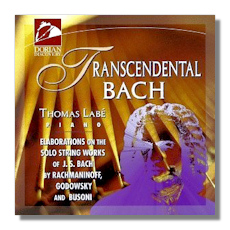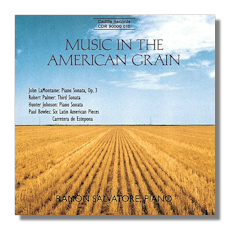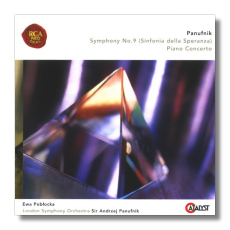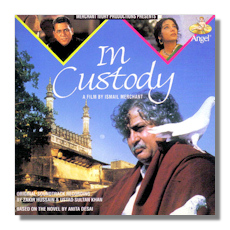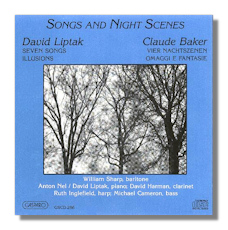
The Internet's Premier Classical Music Source
Related Links
- Latest Reviews
- More Reviews
-
By Composer
-
Collections
DVD & Blu-ray
Books
Concert Reviews
Articles/Interviews
Software
Audio
Search Amazon
Recommended Links
Site News
 Article
Article
Odds and Ends
The plangent sound of the Franz Schubert Quartett is heard in two Tchaikovsky Quartets (Nimbus NI5380). The vast Nimbus acoustic heightens the woe of the Third Quartet's andante funebre, written at the nadir of Tchaikovsky's self-loathing. A sham wedding to "cure" his homosexuality failed soon after. Not the sort of music to pass an easy evening with friends. The familiar First Quartet in D rounds out this challenging disc.
Mozart's second visit to Italy produced the Six Milanese Quartets, performed here by the Talich Quartet (Calliope 9246). The style is all ingenuous grace, brimming with life. Some intonation and ensemble raggedness crop up in places, but the Talich is well served by the recording quality. A fine job.
The Arden Trio serves up four Haydn Trios with engaging wit (Canal Grande CG9108). The players seem particularly attuned to Haydn's quicksilver moods: the andantes flow with a creamy legato; the rondos course with excitement. I was really taken with pianist Thomas Schmidt. Sonics are quite good, if not as transparently close as the Talich.
In Transcendental Bach (Dorian DIS-80117), we find the nexus of splendid recording venue and the "merciless virtuosity" (see the liner notes) of pianist Thomas Labé as applied to transcriptions by Rachmaninoff, Godowsky, and Busoni. The product is efficient, chiseled playing; but the phrasing strikes me like a stroll through a subdivision – the same house viewed four different ways. If you are seriously interested in this repertoire, you'll want to explore some individual performances by Bolet, Wild, Rian de Waal, and Marc-André Hamelin.
Etcetera Records contracted Valery Boyev to excavate some early Piano Music by Tchaikovsky (KTC1164), and he emerged with some pretty rough hewn staves. The sonata from 1865 has a Schumannesque brashness – stout chords and a flair for the dramatic – but the thematic treatments lack the German's pianistic imagination. Conservatory workouts of a very talented composer.
The sesquicentennial of Grieg's birth (1843) was marked by a host of tributes. An ambitious one, spanning all the piano works, songs and chamber music comes from Victoria A/S. I can speak only to a few volumes of the Solo Piano works as played by Geir Henning Braaten – they are excellent! In addition to works written solely for the piano, we have Grieg's own transcriptions of music such as Peer Gynt and the Holberg Suite. The discs are generously filled and attractively recorded.
Music in the American Grain presents pianist Ramon Salvatore in a program of American moderns. Two premières are claimed, Paul Bowles' (yes, the writer!) "Carretera de Estepona" and a piano sonata (1937) by Hunter Johnson. The music is thin on sentiment, more braced for war. Even in Salvatore's capable hands, the square, Hindemithian tonalities have limited appeal. Available from Cedille Records (CDR90000010).
Also on Cedille (CDR90000014) is the debut of duo-pianists Georgia and Louise Mangos, performing four transcriptions of Liszt Tone Poems, among them Les Préludes. The imaginative settings, soaring from delicate lyrics of Orpheus to the tawdry thunder of bass tremolos, are the composer's own. The Mangos give it their all. Gouts of sound pour forth as they play out the fate of gods and men. Would it be presumptuous to ask for a little more articulation? This one should find its fans.
Three years ago I heard a San Francisco Symphony concert of "new" music and was taken with Andrzej Panufnik's Arbor Cosmica: Twelve Evocations for Twelve Strings, a beautiful and efficient rendering of the cosmic "tree of life." Panufnik writes tonally spare, rhythmically vital music often based on elaborate geometric schemes. To his credit, he never lets his "generative devices" overwhelm his own spontaneous feel for the music. Conifer Records (U.K.), in association with Technics, has recorded much of his output. Two excellent CDs to start with are the Violin Concerto (1971), Hommage à Chopin (1966), and the Bassoon Concerto (1985) (CDCF182), and the Symphony #9 "Sinfonia della Speranza" (1990) and the Piano Concerto (1982) (CDCF206, reissued on RCA Catalyst 82876-64280-2), featuring the London Symphony conducted by the composer.
American composer Margaret Buechner's Erlkönig casts Goethe's poem of the same name as a rather expansive tone poem, each stanza corresponding to an orchestral tableau. Unfortunately, the vast scale of her orchestration and her reluctance (or subtlety?) in thematic development tend to vitiate the drama. I need more blatant pictorialism – a child is being torn from his father's arms! John Varineau leads the Royal Scottish Orchestra on Nord-Disc 2024. Impressive sound.
Newly mastered for CD are the two Shostakovich Cello Concertos performed by Viviane Spanoghe (Talent DOM291011). The better known First concerto dates from 1959 and is dedicated to Rostropovich. Emil Tabakov and the Sofia Soloists provide energetic accompaniment; there's plenty of folksy dissonance as the cellist churns the theme over punchy horns and flutes. The good performance is mitigated slightly by erroneous tracking of the movements and mention in the notes of a sonata for cello and piano that is not on the disc.
Two soundtracks I have enjoyed are In Custody, (Angel 55097) and Jeanne la Pucelle (Auvidis K1006, distr. harmonia mundi usa). Accompanied by lush classical Indian music cues, In Custody tells the story of Urdu poet Faiz Ahmed Faiz. The musicians are the best available; the vocal renditions of Faiz's love poetry are stunning, even without the benefit of translations. Jeanne (Joan of Arc) strives for even truer authenticity, with viola da gamba player and musical director Jordi Savall at the helm of an original instruments group. The music, from Guillaume Dufay, Savall, and anonymous Fifteenth Century sources, runs the gamut from chant to rousing marches. Superior, naturalistic sound and fine notes round out this release.
David Liptak and Claude Baker share the billing on Gasparo recording of their works titled Songs and Night Scenes (GSCD-286). William Sharp (baritone) provides a sympathetic reading of Liptak's Seven Songs, settings of poems by James Wright. I found the songs too abstracted from the poetic form – the distended phrasing spoils the natural rhythms of speech. Single words, instead of complete images, become the locus of meaning. Coupled with the pointillist dabs from the piano, the bitterness of Wright's texts are dissipated. Baker's Vier Nachtszenen for harp show a masterful control of mood: in scene one he evokes, Falla-like, an eerie Spanish garden, full of romance and danger. In another, the harpist tweaks the tuning levers of her harp to mimic the sound of a koto. Worth hearing.
Two other modern composers sharing a program are Allan Blank and Margaret Brouwer. I took an immediate liking to Blank's Moments in Time, scored for oboe and piano. The first two movements have some very wistful writing for the oboe. Brouwer has done some interesting reading into the dynamics of water flow and applied the formulas to her compositions: Riding the Easy Five Mile Sluice is the result. A similar formula is applied, more succinctly I think, in a piece for viola titled X4-1=0. The violist, Ellen Rose, also makes a good case for Chaconne2, a baroque-minded essay with piano accompaniment. Available on Centaur CRC2138.
Copyright © 1997, Robert J. Sullivan.













